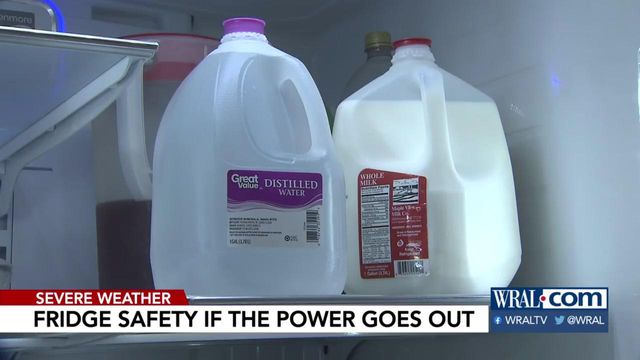Here's what to do if you lose power
Severe weather can cause power outages in your area. It is important to know how to report an outage and what to do to keep you and your loved ones safe.
WRAL has a team of meteorologists tracking the weather each day to bring you the latest information about potential severe weather in your area.
What to do before a storm hits and power is lost
Create an emergency kit. It should have food, water, medication and any other supplies you may need for 72 hours.
Get extra batteries to power radios, flashlights and portable phone chargers.
If medications or other necessities need to be refrigerated, develop an alternate plan to keep them stored at the proper temperature. Get a cooler and ice ready to store perishables.
What to do if you lose power
Call your electric company to report the outage.
These are area energy providers:
- Duke Energy: 800-769-3766 or text OUT to 57801
- Duke Energy Progress: 800-419-6356 or text OUT to 57801
- Wake Electric: 919-863-6499 or 800-743-3155
Ready NC suggests the following tips:
- Do not open refrigerators or freezers unless absolutely necessary. Cold air can escape, allowing food to thaw more quickly.
- Turn off and unplug appliances and computers.
- Leave one light on so you know when power comes back.
- Find the electrical circuit box. Turn off individual circuits before shutting off the main circuit.
- Try not to use candles because they are fire hazards.
- Do not use a gas stove for heating.
- Do not use generators indoors or in the garage. They can cause deadly carbon monoxide poisoning. NC Electric Cooperatives says that generators need to be in a dry, well-ventilated area away from air intakes into the home. The generator should be properly grounded and connected to appliances with proper power cords.
- If you see downed power lines, stay away from them and report them.
What to do when you return home after a storm hits
Ready NC suggests the following tips:
- Check your home before going inside. Walk around the outside and look for loose power lines, gas leaks and building damage.
- Watch for fallen power lines, weakened walls, bridges, roads and sidewalks.
- Watch out for animals like poisonous snakes. Use a stick to poke through debris.
- Use a battery-powered flash light to inspect the damage, but turn the flashlight on outside before entering the building. This is important because there could be a gas leak, which could be ignited if the battery causes a spark.
- Use a battery-powered radio to keep updated on emergency information. Make sure to pack extra batteries.
- WHEN NOT TO ENTER: If you smell gas or if there are still floodwaters, do not enter your home. Also, if your home has been damaged and authorities have not declared it safe, do not go inside.
What to do if you see a downed power line
If you see a downed power line, immediately leave the area and call your electric company or 911. Do not make contact with any tree branches or debris that could be touching the downed line. Always assume a downed power line is live.
What to check when you enter your home after a storm
Ready NC suggests the following tips:
If you smell gas or hear a hissing sound, open a window and exit the home. If you can turn off the main gas valve from outside, do it. Leave the home and call your gas company. A trained professional is needed to turn the gas back on. DO NOT smoke or use oil, gas lanterns, candles or torches until you are sure there is no gas leak.
- Look for sparks, broken or frayed wires. If you can, turn off the main fuse box or circuit breaker. If you cannot, then leave and call for help. Do not turn on lights until you know they’re safe to use.
- Look for cracks in the roof, foundation or chimney. If the building looks like it might collapse, then leave.
- Check for damaged appliances. If appliances are wet, turn off the electricity at the main fuse box or circuit breaker. Then, unplug appliances and let them dry out.
- If you have damaged pipes, turn off the main water valve. Check with local authorities before using any water because the water could be contaminated. Do not flush toilets until you know that sewage lines are intact.












